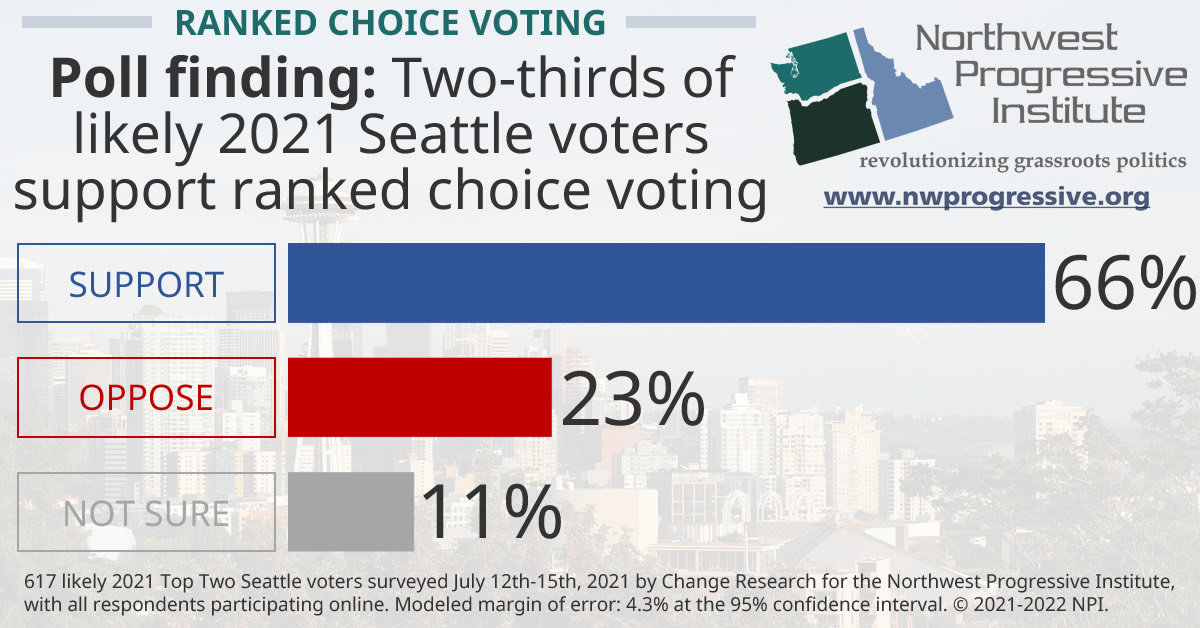This autumn, Seattle will be at the center of a lively debate concerning alternative voting methods after the City Council voted to submit a proposed ordinance to deploy ranked choice voting (RCV) to the citywide ballot alongside a citizen-sponsored initiative (I‑134) that would implement approval voting.
The city’s nine-member legislative body had the option of sending I‑134 to the ballot by itself or with an alternative that would give Seattle voters a choice of voting methods. In a series of votes, the Council decided that voters ought to be able to consider both RCV and approval voting at the same time.
NPI’s research suggests that voters will welcome this move by the Council.
In our first-ever poll of the Seattle electorate, conducted a year ago for NPI by Change Research, we found that two-thirds (66%) of likely 2021 voters in Seattle were supportive of ranked choice voting, while only 23% were opposed and 16% were not sure. That’s a margin of nearly three-to-one.

Here’s the question we asked and the responses we received:
QUESTION: Seattle’s current plurality voting system requires people to vote for a single candidate in each contest. Do you support or oppose switching to a ranked choice instant runoff system instead, allowing voters to rank their favorite candidates in order until a single candidate has a majority? Under this system, ballots would be counted in rounds where the last place candidates for office would lose and the candidate with the most votes in the final round would win.
ANSWERS:
- Support: 66%
- Strongly support: 42%
- Somewhat support: 24%
- Oppose: 23%
- Somewhat oppose: 7%
- Strongly oppose: 16%
- Not sure: 11%
The survey these answers are from, which was conducted by Change Research for the Northwest Progressive Institute during last year’s local election cycle, has a modeled margin of error of 4.3% at the 95% confidence interval. All 617 respondents participated online. The poll was in the field from Monday, July 12th, 2021 through Thursday, July 15th, 2021 — which was one year ago this week!
Ranked choice voting and approval voting are both types of what’s known as alternative voting methods. As their name suggests, they are ways of choosing elected representatives that differ from the “first past the post” system currently in use in Seattle and across Washington State. Under the current system, voters are limited to voting for just one candidate. The two candidates with the most votes in the first round of Washington’s two-part general election advance to a runoff, and then the candidate with the most votes is elected.
Alternative voting methods like RCV and approval voting liberate from voters from being limited to voting for a single candidate per office in each round of voting.
Here’s an explanation of RCV from FairVote:
Ranked choice voting (RCV) makes democracy more fair and functional. It works in a variety of contexts. It is a simple change that can have a big impact. RCV is a way to ensure elections are fair for all voters. It allows voters the option to rank candidates in order of preference: one, two, three, and so forth. If your vote cannot help your top choice win, your vote counts for your next choice.
Here’s an explanation of approval voting from the Center For Election Science:
Approval voting is a single-winner voting method that allows voters to choose any number of candidates. The candidate chosen the most wins. Approval Voting is most often discussed in the context of single-winner elections, but variations using an approval-style ballot can also be applied to multi-winner (at-large) elections.
RCV is the better known of the two alternatives and is enthusiastically supported by a lot of progressive organizations that work on ballot access and voting justice. A presentation developed for staff to the Seattle City Council notes it is used in New York for primaries there, which would be similar to its intended usage in Seattle if voters were to adopt the Council’s alternative to Initiative 134.
During public comment ahead of today’s vote, NPI urged the Council to pass the ordinance and allow voters to consider RCV in addition to approval voting.
We believe that voters will appreciate being given a choice of alternative voting methods rather than being limited to voting up or down on just one.
The Emerald City is an ideal candidate to pilot RCV in the Pacific Northwest. It’s a large jurisdiction with a more vibrant media landscape and a history of civic engagement. Because Seattleites are enthusiastic about trying alternative voting methods, there is a greater likelihood that the voting public in the state’s largest city will be supportive and receptive when their ballots change.
Seattle’s embrace of an alternative voting method this autumn could help discourage negative campaigning, since future candidates will hope that someone who supports another candidate will also consider voting for them. Changing how we choose our elected representatives won’t solve the problem of lack of civility in our political discourse, but during a time of tremendous polarization, any reforms that make campaigns cleaner and elections more positive is of huge value.


It is extremely bad of fairvote to encourage politicians to interfere in the initiative process as states around the country seek to make it harder to use the initiative system for fear of RCV like reforms. This after fairvote lobbied against allowing voters to use Approval voting in Utah as well. Their hostility to other voting reformers should be questioned.
As well it is a clear abuse of the initiative system that thousands of Approval voting supporters donated time and money and to get it on the ballot, and fairvote can lobby their way onto the ballot and waste those donors money. Fairvote should have had to run their own signature process.
This is exactly why we need to strengthen the initiative process and lock politicians out of the process.